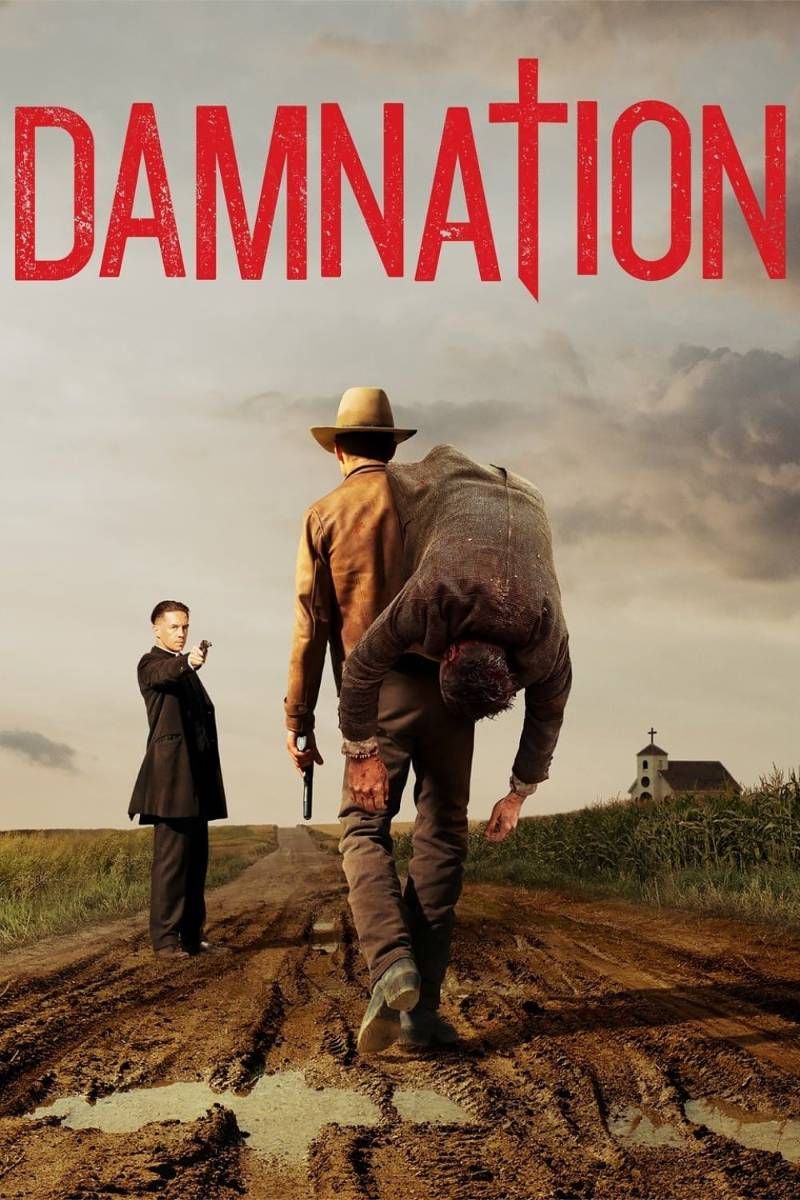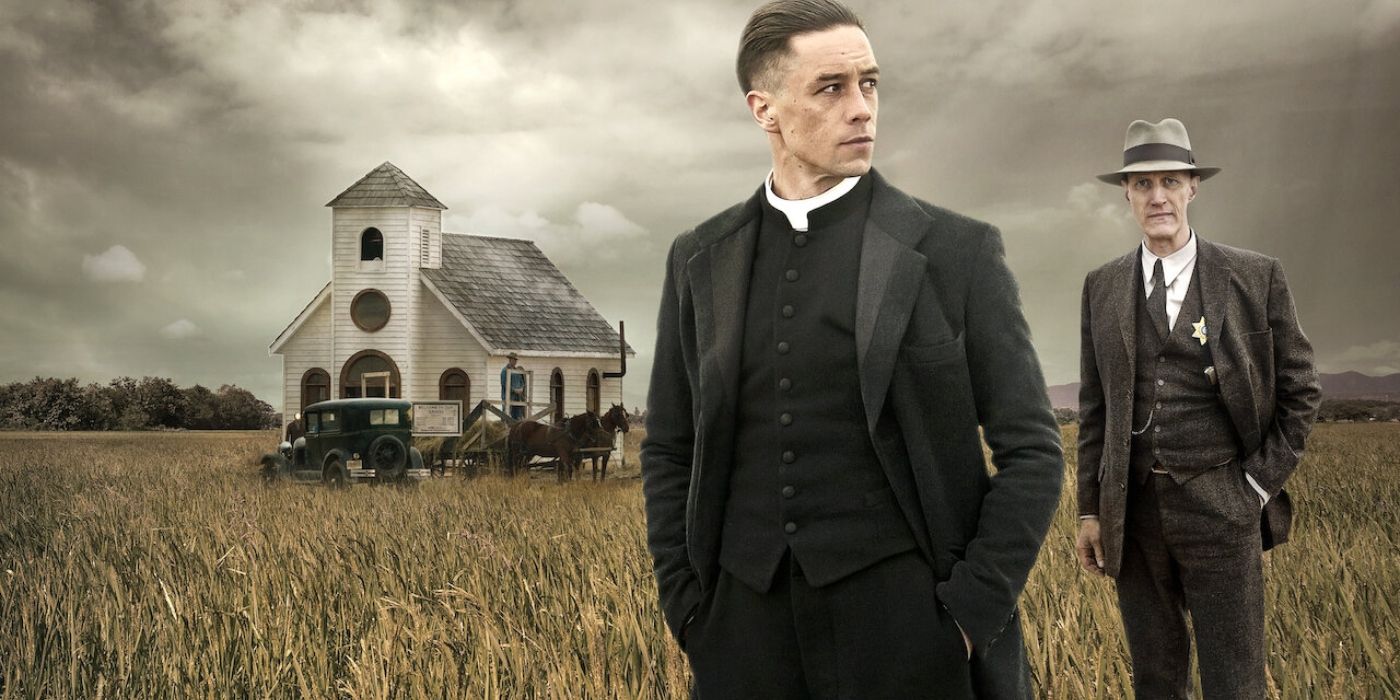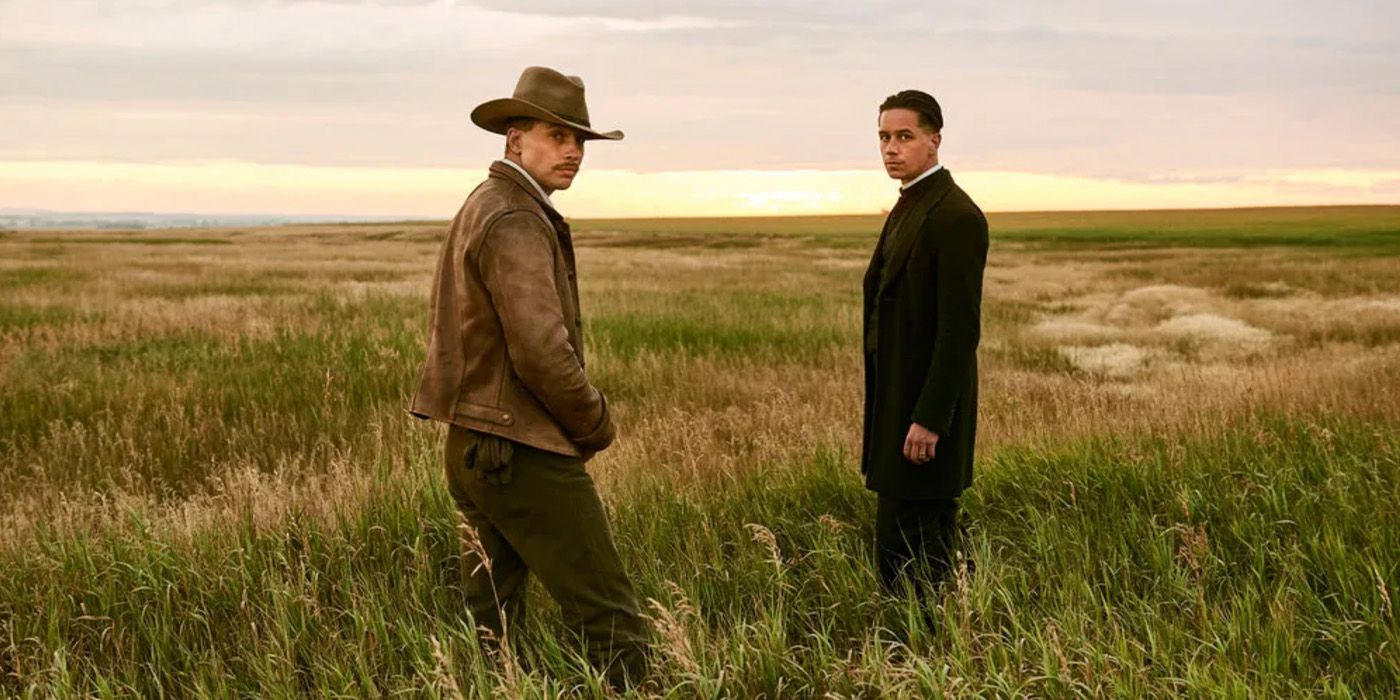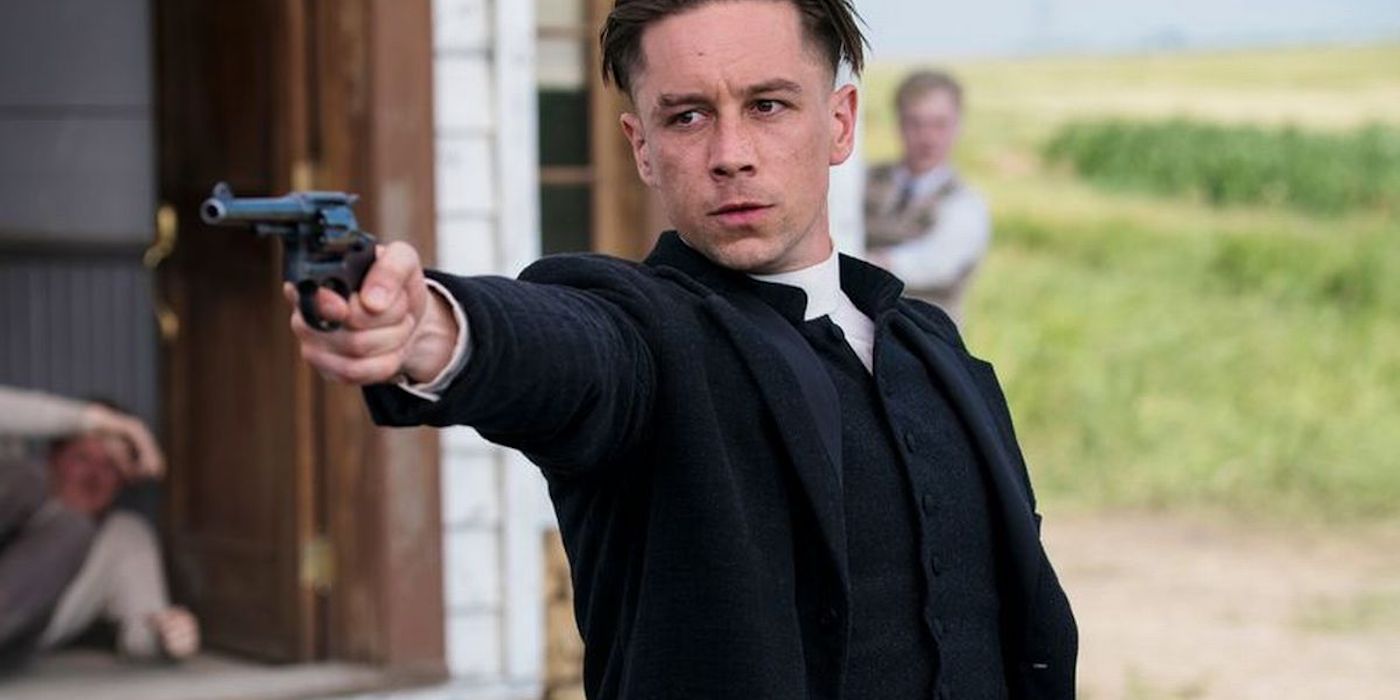The Big Picture
- Damnation offers a unique mix of politics and religion in a Depression-era setting.
- The show's focus on labor strikes, class warfare, and moral dilemmas resonates strongly today.
- Despite its early cancellation, Damnation stands out as a compelling drama worth revisiting.
In the streaming age of television we currently find ourselves in, it's impossible to watch everything. Whether a show is on television or online these days is almost a moot point, as so many shows find their way to audiences everywhere that we hardly have the time or energy to get to them all. When it comes to Westerns, Taylor Sheridan seems to have most of that market covered, but if you're a fan of his prequel series 1923, another short-lived drama is calling your name. Damnation is a powerful period drama that predates even Sheridan's take on this controversial time in American history, and it's a show well worth revisiting even after years off the air.

Damnation
An epic saga about the secret history of the 1930s American heartland, centering on the mythic conflict and bloody struggle between big money and the downtrodden.
- Release Date
- November 7, 2017
- Cast
- Logan Marshall-Green , killian scott , Sarah Jones , Chasten Harmon , Christopher Heyerdahl , Joe Adler , Philippa Domville , David Haysom
- Main Genre
- Western
- Seasons
- 1
- Creator(s)
- Tony Tost
'Damnation' Is a Compelling Depression-Era Western Drama
Having first premiered in 2017, Damnation was created by former Longmire scribe Tony Tost (the guy behind that exceptional "Dog Soldier" episode), who made the series in partnership with both Universal Cable Television and Netflix. While the show was fronted by Netflix online, Damnation aired weekly in the United States on the USA Network from November 2017 until January 2018. Chronicling a farmer's strike in Holden, Iowa, the series primarily follows two conflicting characters: the preacher Seth Davenport (Killian Scott) and the strikebreaker Creeley Turner (Logan Marshall-Green) as they find themselves on opposite sides of progress during one of the toughest times in American history. Damnation ran for only one season of 10 episodes before it was canceled, but it made quite an impact with the time it was given.
"I describe it as 1/3 Clint Eastwood, 1/3 John Steinbeck, 1/3 James Ellroy," creator Tony Tost once noted about the series (via The Lafayette Flyer). "That is, it takes some characters you’d normally see in a tough western, plops them in the world of Grapes of Wrath, and places them in the sort of pulpy paranoid narrative you see in Ellroy’s novels." It's easy to see the John Steinbeck influence on Damnation for sure, given the tough, working-class subject matter and the Great Depression-era setting. James Ellroy's balance between pessimism and morality (mixed with tinges of conflicted faith) is certainly at play here too, and who could ignore the clear Western influences, particularly Clint Eastwood films like Pale Rider and Hang 'Em High? Being executive-produced by the likes of James Mangold (3:10 to Yuma, Logan) and David Mackenzie (Hell or High Water) doesn't hurt either.
But while Tost's description of his series is accurate, pulling apart the specific references and influences isn't what makes Damnation interesting in and of itself. The show is compelling because of the subject matter: labor strikes, technological innovation, political divides, social consciousness, class wars, racism, and the role of religion in society. Each of these concepts is as relevant today as they were back in 1931, and while Damnation remains in its lane as a strict period drama, it's a show that's easy to see reflected in our world today. "The parallels are often spooky," Tost noted, and truly they are, even if all the particulars and players involved are different. But beyond the political themes packed into this USA/Netflix co-production, the show thrives because it's rooted in dark, family drama of biblical proportions. And no, that's not an overstatement.
Two Brothers Are at the Center of 'Damnation'
Seth Davenport and Creeley Turner are on opposite sides of the war for the soul of Holden County. On one hand, Seth preaches to his congregation in hopes of inciting penny auctions and grassroots activism. He aims to see the farmers of Holden treated with respect and dignity. Using the Word of God as his sword, Seth leads the strikers faithfully, using them to start a political revolution. Creeley, on the other hand, is employed by the Pinkerton Agency to see that the strike is broken up without too much of a fight. Working on behalf of the banks and other elites hoping to end the strike, he's unafraid to kill whoever gets in his way, making for an especially bloody opening scene. To make things worse, these two are estranged half-brothers, and they couldn't hate each other more.
While the reasons for their feud are understandable (we won't disclose that here, it's too big a reveal), these Wyoming-bred brothers are constantly getting in the way of the other, and it's their dynamic that elevates Damnation to something bigger than a simple Depression-era tale. While Taylor Sheridan's 1923 has Harrison Ford, Helen Mirren, and a host of other Duttons behind it to pull audiences in, Damnation's succession is due to Killian Scott and Logan Marshall-Green, who kill it in their respective roles. What could've easily been just your standard period-set class drama with thinly veiled political undertones turns into a mysteriously personal work that feels more akin to a biblical tale. Like the Old Testament story of Jacob and Esau, these brothers each have glaring faults that they attempt to overlook as they put the other down. Unlike the biblical narrative, neither Seth nor Creeley is exactly the "good guy" here. They may both try to be, but they do so in their own morally ambiguous ways.
On top of their personal wickedness, both brothers are attempting to atone for their own sins. Seth does this spiritually by becoming a preacher. While his faith is something of a mask at first, it becomes real over time, and he soon recognizes that the only way he'll find forgiveness is from the Almighty above––well, that and fighting against the "progress" loitering at their doorstep. At the opposite end of the spectrum is Creeley, who has spent enough time in a Wyoming prison so that he feels like he's done enough. This proves untrue, however, as his employers continually hold his conviction and sentence (which they got him out of) over his head. Hoping to pull out from under their thumbs, he fights like hell to put an end to the labor war, and by extension, his brother. No doubt, the shared and complicated past between Seth and Creeley makes for some damn good television. If only we'd gotten another season.
The Mix Between Politics and Religion Makes 'Damnation' Unique
Politics and religion are generally the two topics most avoided in casual conversation, though, in the context of Damnation, nothing could be further from the truth. While it feels nearly impossible to escape some sort of political proselytizing in Hollywood these days, mixing politics with religion (but not church and state, usually) is Damnation's trademark. The series is boldly irreverent in its use of the Christian scriptures, mixing them with unionized action to produce something much more volatile––not to mention violent. The way that Seth wields his spiritual platitudes is comparable to Gary Oldman's character in The Book of Eli, or perhaps the late-night televangelist who goes on air after dark. It's certainly not an accurate representation, at least not entirely, of what the Bible says.
Of course, unlike those who use the Good Book as a power trip, Seth does so for "the greater good" of producing revolutionized action on behalf of the workers unable to provide for their families. Yes, there is some serious manipulation involved, but at least Seth cares about those he's influencing. He may not be the most noble character, nor is he a particularly good minister (preaching tactics aside, he's seriously lacking theologically). But just because Seth hasn't been sanctified yet doesn't mean he isn't getting there. As mentioned before, what starts as a con soon becomes a reality for the activist-turned-minister, who finds God amid his bloody trials and tribulations. Throughout the series, he comes to care just as much about the people involved as the message––which he has failed to spread elsewhere––and is even willing to compromise his political ideals to help his fellow man (i.e. accompanying a struggling dairy farmer to sell in town, despite how it will affect the strike).
The way that Damnation plays the relationship between Seth and his wife Amelia (Sarah Jones) is particularly well done. Amelia is very much the woman behind the preacher. She's the one writing his sermons from behind the scenes, unbeknownst to most. A political radical and one unwilling to compromise if she can help it, Amelia is just as important to the strike as Seth is, even if her plotline isn't as morally appetizing. Another character worth mentioning here is Creeley's prostitute-turned-secretary Bessie Louvin (Chasten Harmon), who is perhaps the most important supporting character in the entire series. Bessie not only pulls Creeley out of the fire more than once but is almost directly responsible for uncovering the secrets of the Black Legion vigilante group, a branch of the KKK. These powerful women make Damnation run strong, and keep themselves busy even without the leading men around.
'Damnation' Was Canceled Too Soon, but Stands Tall on Its Own
At the very least, Damnation is a speculative history lesson that opens the door to a time that most today don't know all too much about. Before this show, this author didn't know a lick about the Black Legion, the Pinkerton and William J. Burns International Detective Agency's roles in strikebreaking, or the Harlan County War (the initial basis for the show's events). Thankfully, series creator Tony Tost had done his research, preparing a dramatic meal for those willing to learn more. "Back in my academic days, my field of study was American literature from 1890 to 1945 and I wrote a dissertation on the influence of new technologies in the 20s and 30s on the American imagination," Tost explained back in 2017. "Then I wrote a book about Johnny Cash which delved into the same time period from a different angle, looking at the music and preachers and myths of Americana." Taking all these elements, Tost penned the first three episodes of Damnation (and later the finale) and oversaw an impressive series that feels more timely now than ever.
Despite being canceled on an unresolved cliffhanger, the USA/Netflix show thrives as a standalone drama. Damnation may have had more life left in it, to be sure, but it can be watched and enjoyed on its own without the desperate need for resolution. After all, there's no easy way to end a series about farmers' strikes set in the early 1930s, at the very beginning of the decade-long Great Depression. Well-rounded and resolved character arcs are more than enough to see audiences through, and even if we don't know what becomes of Sheriff Don Berryman (played by the delightfully charming Christopher Heyerdahl), the sociopathic Connie Nunn (Melinda Page Hamilton), or the rest of Holden County, we can be sure that we've already seen them at their best––and undoubtedly their worst. Still, it's too bad we couldn't hear just one more of Seth's provocative sermons...
Damnation is available to buy on Prime Video.



